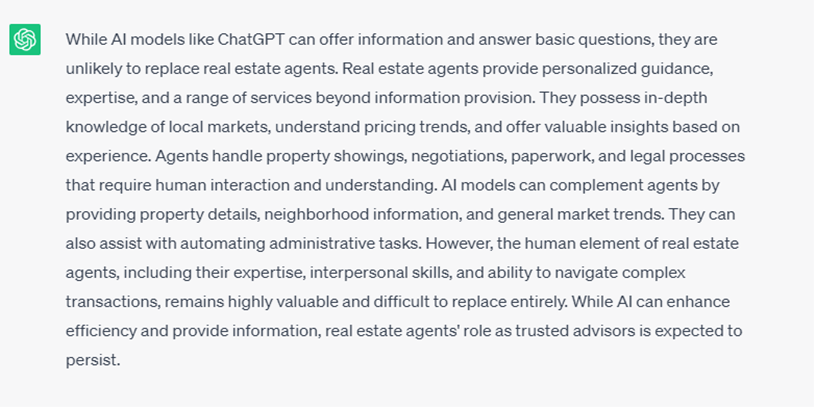You are viewing our site as an Agent, Switch Your View:
Agent | Broker Reset Filters to Default Back to ListHow to stop worrying and learn how to love ChatGPT (and its uses in real estate)
August 15 2023
 There is a lot of excitement about the promise of AI-powered tools like ChatGPT, and a lot of confusion about some of their (false) promises. There's also no small amount of anxiety about the future of the industry as automation becomes increasingly popular, widespread, accurate, and inexpensive. Do agents need to worry about their jobs? Or can AI be a tool for good? This article will attempt to answer some of these questions, with a (little) help from ChatGPT itself (but we can assure you, most of this article was written by a living, breathing human).
There is a lot of excitement about the promise of AI-powered tools like ChatGPT, and a lot of confusion about some of their (false) promises. There's also no small amount of anxiety about the future of the industry as automation becomes increasingly popular, widespread, accurate, and inexpensive. Do agents need to worry about their jobs? Or can AI be a tool for good? This article will attempt to answer some of these questions, with a (little) help from ChatGPT itself (but we can assure you, most of this article was written by a living, breathing human).
What is artificial intelligence (AI)?
Last year, we predicted that artificial intelligence was one of the top trends to watch in real estate tech. We couldn't have been more right. Since then, broad-scale application of AI has taken off, and innovative companies are finding novel ways to use it in every single industry.
But what is artificial intelligence (AI)? Let's recap: AI uses the power of computers to do things that used to be reserved for humans: "seeing" and recognizing things from pictures, recognizing and processing human speech, making complex decisions, writing text, and even driving cars. AI relies on vast amounts of data, computer programming, machine learning, and deep learning. It is incredibly complex, and until very recently, was reserved for a select few and the scientists working on the models that power it.
How can AI be applied to the real estate industry?
Real estate is a data-driven industry, and artificial intelligence has the superpower of being able to sort through and spot patterns in data faster than any human ever could, and faster than computers traditionally could in the past, too. This means that there are dozens of applications for AI in the real estate space, including:
- Property search and recommendations: More accurate and more personalized property searches based on consumer preferences and needs.
- Market analysis and accurate pricing: AI algorithms can look at historical data to identify trends, current market conditions (when provided), and predictive analytics to estimate exactly what a particular property will sell for.
- Chatbots and virtual assistants: Chatbots can help brokers and agents serve consumers better by being available 24/7 to answer questions and provide support. The buyer or seller's agent can pick up where the chatbot left off when they log back in.
Is AI going to put real estate agents and brokers out of business?
Real estate has always been a relationship business. It's about who you know, who you can connect to whom, and how well you serve your clients. Tech tools are a great way to serve them better, but without human connection, your business will be sunk before it even sets sail.
AI can help real estate professionals save a lot of time and think outside the box. It can speed up brainstorming, writing listing descriptions, editing text, finding higher quality leads, and more. But it is not a replacement for professional expertise. Not convinced? Here's what ChatGPT has to say itself:

How can real estate agents and brokers use ChatGPT?
There are many ways agents and brokers can use tools like ChatGPT to make their work easier. Here are a few that we came up with ourselves:
1. Listing descriptions
 Sometimes, the inspiration simply isn't flowing. In some offices, an admin writes all the listing descriptions being input into the MLS, not the listing agent, which means that during busy periods, an admin could be writing a dozen descriptions in a single day. By the tenth one, they're probably running out of things to say. A tool like ChatGPT can help write a great first draft.
Sometimes, the inspiration simply isn't flowing. In some offices, an admin writes all the listing descriptions being input into the MLS, not the listing agent, which means that during busy periods, an admin could be writing a dozen descriptions in a single day. By the tenth one, they're probably running out of things to say. A tool like ChatGPT can help write a great first draft.
Our headquarters is in Newport Beach, California. To test this tip, we asked ChatGPT to write a 150-word listing description for an unlisted property down the street from our office. This is what it wrote (we have not made any edits except redacting the address):
Introducing [address], a captivating residence nestled in the desirable Newport Beach, California. This stunning property offers a harmonious blend of modern elegance and coastal charm. The meticulously crafted architecture showcases a timeless appeal, while the location provides convenience and tranquility.
Step inside to discover an inviting interior flooded with natural light. The open floor plan seamlessly connects the spacious living areas, creating a perfect environment for entertaining guests and enjoying everyday living. The gourmet kitchen boasts top-of-the-line appliances, sleek countertops, and ample storage space.
Retreat to the luxurious master suite, featuring a private balcony and a spa-like en-suite bathroom. Additional bedrooms offer comfort and versatility for family members or guests. Outside, the landscaped backyard invites relaxation with its lush greenery and a serene patio area.
Conveniently situated near pristine beaches, renowned schools, and vibrant shopping and dining destinations, this residence offers the epitome of coastal living. Don't miss the opportunity to call this house your home—an idyllic sanctuary in Newport Beach.
Is this description perfect? Far from it. But it is a highly perfectible first draft that the listing agent or admin can customize with the relevant details. They can even ask additional questions or provide additional details (like number of rooms, featured amenities, etc.) to refine the description even more, or ask ChatGPT to make it sound more luxurious, more casual, or easier to read.
2. Nurture campaigns
Nurturing new leads is one of the most important things real estate agents do. Considering that real estate leads can take months, if not years, to convert, keeping them warm is key. We've shared our own tips for effective nurture campaigns, and ChatGPT can be a helpful resource for designing a whole persona-based nurture campaign and even creating a first draft of the emails you can send. We asked ChatGPT to design a five-email nurture campaign for a first-time homebuyer, and here are the subject lines of the five emails it suggested:
- Welcome to the Exciting World of Homebuying!
- Discovering the Perfect Place to Call Home
- Let's Find Your Dream Home!
- Crafting a Winning Offer for Your Dream Home
- Closing Day Is Almost Here!
A great nurture campaign is the foundation, but the most efficient, successful agents also have a real estate CRM to help them put their campaigns into action.
3. Social media posts
 Social media is a goldmine for real estate leads, but it can also be a tough medium to master. And while tips abound to help real estate agents get the most out of social media, sometimes, it's just too challenging to come up with relevant, readable content on your own. This is where chat ChatGPT can come in handy: type a prompt like, Please help me write three tweets to encourage potential homebuyers to visit my open house at noon on Sunday, and watch as ChatGPT helps you write and format three tweets, complete with hashtags. You can edit them, find the perfect listing photos to go with them, and schedule them to post throughout the week.
Social media is a goldmine for real estate leads, but it can also be a tough medium to master. And while tips abound to help real estate agents get the most out of social media, sometimes, it's just too challenging to come up with relevant, readable content on your own. This is where chat ChatGPT can come in handy: type a prompt like, Please help me write three tweets to encourage potential homebuyers to visit my open house at noon on Sunday, and watch as ChatGPT helps you write and format three tweets, complete with hashtags. You can edit them, find the perfect listing photos to go with them, and schedule them to post throughout the week.
Better yet, you can pair tweets that ChatGPT helped you write with an automated social publishing tool like Constellation1's Digital Marketing Suite, which puts your social media marketing on autopilot and generates relevant posts from your active listings, industry news, real estate tips, and more.
We thought there must be other ways ChatGPT could help agents, so we asked it to suggest the top three ways it can help make brokers' and agents' work easier. Here's what it said (shortened from the original output, but not substantively edited):
- Lead Generation and Qualification: ChatGPT can engage with potential clients, capture their information, and qualify leads.
- Customer Support and Information Provision: ChatGPT can handle basic customer inquiries, provide information about properties, schedule appointments, and answer frequently asked questions. This frees up agents' time by automating routine tasks, allowing them to focus on more complex client needs and providing personalized assistance when required.
- Market Research and Insights: ChatGPT can be trained with up-to-date market data, enabling agents to quickly access information on property prices, market trends, and neighborhood demographics.
As you can see, there are a lot of ways agents and brokers can harness the power of ChatGPT. However, the first claim about being able to generate and qualify leads is an interesting one. If you ask ChatGPT to elaborate on how to do this, it gives you a whole list of tasks that include finding a ChatGPT-compatible platform, training it on your lead criteria, setting it up with lead capture, teaching it how to qualify a lead, then integrating the platform with your CRM, and finally assigning leads to a nurture campaign. It's a lot! Thankfully for you, there are already lots of tools available that can help you capture and route leads with incredible speed and accuracy. Why not save time and effort and look into the best real estate CRM that already exists on the market?
Some important warnings about ChatGPT for real estate
 There has been a lot of hype and excitement about AI in general and ChatGPT in particular in recent months, and given how quickly things are advancing, this hype is not going to die down anytime soon. Even still, there are well-documented issues with large language models like ChatGPT that all real estate professionals should be aware of:
There has been a lot of hype and excitement about AI in general and ChatGPT in particular in recent months, and given how quickly things are advancing, this hype is not going to die down anytime soon. Even still, there are well-documented issues with large language models like ChatGPT that all real estate professionals should be aware of:
- Hallucination: Hallucination is a phenomenon where the model generates responses that seem plausible (and confident) but are not based on factual information or have no grounding in reality and are in fact completely false. This could be about something as simple as a fact about the neighborhood a property is located in or something more complex, like disclosure requirements in a neighboring state. This is why your expertise as a professional is always important.
- Lack of Common Sense and Context: ChatGPT is predictive, it's "guessing" what the next likeliest word in a phrase should be to answer the prompt you've given it. It's not actually thinking, and it isn't "smart." This means that answers are based on statistical patterns, not intelligence. So, oftentimes, answers are completely nonsensical.
- Bias: Models are trained on data that was necessarily generated with some sort of bias, and therefore answers will always exhibit a certain level of bias, too. Looking at answers through this lens will help you identify and reduce bias in anything ChatGPT gives you.
- Ethical Concerns: ChatGPT has been accused of plagiarism, privacy violations, copyright violations, and more. Anything that you input into ChatGPT becomes part of the public domain, and so using it with confidential information can pose a potential legal risk to you or your brokerage. Avoid typing in any personal identifying information (names, phone numbers, etc.) or anything confidential. You may also decide to include a disclaimer identifying any material that was generated using AI, so readers know when they're looking at content that an expert on your team wrote, versus a tool like ChatGPT.
Parting wisdom for real estate professionals who want to work well with ChatGPT
Here are a few common-sense rules to help you add ChatGPT to your work while minimizing the risk of any issues:
- Take everything you read with a grain of salt. Don't assume anything is correct because ChatGPT said it is. The consequences could be serious.
- Put your own spin on it. Reword, paraphrase, add your own flair, whatever you need to do to make ChatGPT output sound like your own writing, in your own voice. This will help you sound authentic and personable, even when it's a computer helping you write.
- Perfect your prompts. Answers can vary widely depending on what you ask. If you don't get an answer that satisfies you, ask your question another way, or ask ChatGPT to refine its answer. You may be surprised what new nuggets you find.
In the end, ChatGPT says it best:
While ChatGPT can support real estate agents, it is important to note that it is not a substitute for the personalized expertise and guidance that agents provide. Agents should still maintain a hands-on approach in complex negotiations, building relationships with clients, and offering tailored advice throughout the home-buying or selling process.
To view the original article, visit the Constellation1 blog.









